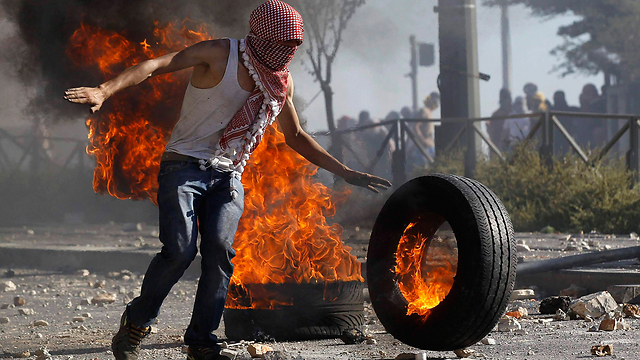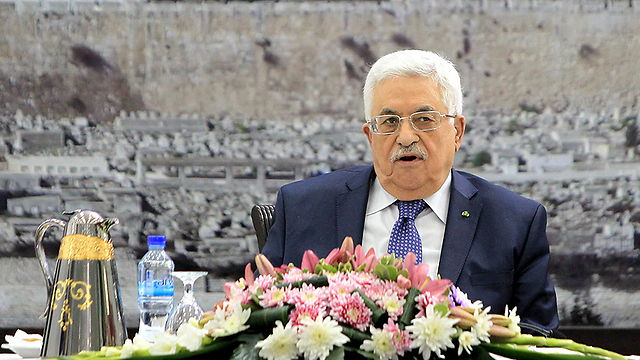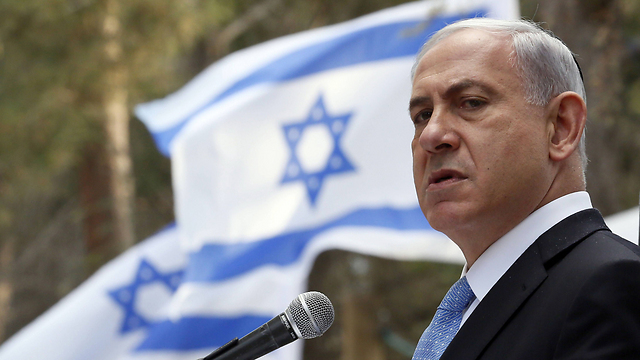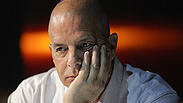
What lies ahead for Israel
Op-ed: The Jerusalem Intifada offers a glimpse into the future to which the right-wing is leading us: A bi-national state with mixed populations and a reality of escalating confrontations. This deterioration can be stopped, but the government, in particular our prime minister, excels at doing the opposite.
During these difficult times, I believe it is possible to slow the escalation of violence, and even stop it altogether. The formula is determination on the security front combined with stately and political enterprise and courage. The only problem is that these are traits that are lacking in the current government.
As a graduate of two "intifadas” and numerous conflicts, military operations as well as wars, I am convinced that the approach claiming that the only solution is more power – as we are told over and over again by the right-wing parties – is outdated.
Moreover, this situation in Jerusalem is a preview to the reality we are going to face if Bayit Yehudi (Jewish Home party) has its way with its delusional plan for a bi-national state.
The current situation also teaches us how dangerous right-wing inflammatory extremism is, when combined with the inexperience of its leaders in issues of security and the Middle East. This can lead us to grave complications that we may not know how to resolve.
In order to deal with the severe deterioration, one needs a profound understanding of what is really happening on the ground, without placing the blame on whoever is found to be politically convenient. Without this understanding, we have no chance of succeeding.
An intifada is not something determined by fate. It is a state of mind of a population (the reasons for which is essential to understand), which produces a succession of events and terrorist acts that spiral out of control. The biggest challenge is in understanding how this stream of events can be stopped.
A year ago I published an article calling “to prevent the big explosion now”, in which I specified my recommendations regarding the ways to avoid it.
Unfortunately, the succession of security events from that time until today point, as expected, to a very severe escalation: a continuous flow of terror attacks that reached a peak with the kidnap and heinous murder of the three youngsters Gil-Ad, Naftali and Eyal, may they rest in peace; the just as heinous murder of the Palestinian youth, Mohammed Abu Khdeir; the wave of incitement and racism that washes over all of us; the escalation we are dragged into against Hamas in Gaza, that translated into 50 days of battle in Operation Protective Edge, with more than 70 casualties among our finest boys; the Jerusalem Intifada with the wave of tractor and vehicular attacks, shootings, axes and knives that accompany it, which reached another peak with the massacre during morning prayers in the synagogue in Har Nof.
These grave developments allow us to understand where we are heading before the events spin completely out of control. The escalation in Jerusalem gives us a glimpse into the future that the right-wing would lead us: A bi-national state with mixed populations and no borders, where all the problems that are the root of the conflict still continue to exist.
Despair, frustration and revenge
East Jerusalem is a microcosm for all the problems and the ailments of the Israeli-Palestinian conflict. The relative calm that sometimes prevails in Jerusalem is extremely fragile, and exists thanks to a delicate alignment of balance and brakes that require an educated and cautious policy.
But in an era of no political hope, of governmental weakness (both municipal and state), this alignment can be easily and quickly dismantled, especially when we let the pyromaniacs on both sides stroll around with matches in the most fuel-saturated flammable area in the Middle East - the Temple Mount.
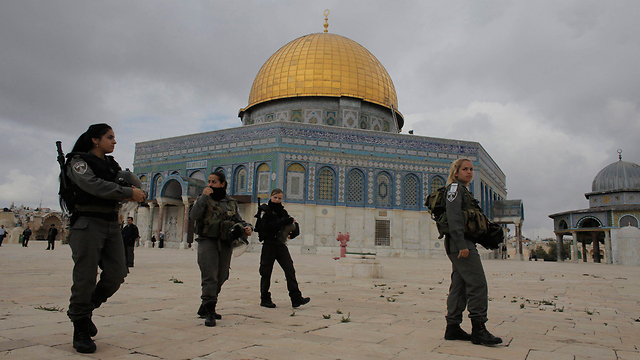
In examining the core reasons for the situation in East Jerusalem, it is clear that the Palestinian population (most of who come from the Hebron area) lives in an impossible state, grave economic hardship, crowded housing, and years of municipal neglect. To all this you can add the wall that divides Jerusalem into lawless ex-territorial zones, and is a result of poor planning.
With a continuous lack of coordination within the Israeli defense system and the mixed population of Palestinian ID and Israeli ID holders – what you get is a barrel of extremely flammable substances. All one needs to make a fire is just a few sparks in the right intensity and sequence.
Stone-throwing, the friction on the Temple Mount, the shooting and vehicular attacks that have been occurring in Jerusalem daily for many long months provide a chance to understand where we are headed if the core issues are not resolved.
One does not have to be an expert in order to understand the characteristics of the events in East Jerusalem, including the tractor and car assaults, do not come from terrorist groups or originate in Mahmoud Abbas’ directives, as the right-wing leaders would like to convince the public - a public which for the most part is unaware of all the facts.
Abbas made a serious mistake in sending a letter of condolence to the family of Yehuda Glick’s assassin, but the security forces in Israel know very well that Abbas and the Palestinian Authority leadership does not encourage terrorist acts or riots. Instead, they are determined to act against terror in the areas under their security control, and try to contain demonstrations and riots.
The events and terror attacks in Jerusalem first and foremost indicate the existence of a certain atmosphere. An aura of despair, frustration and revenge, which festers on a growing feeling among East Jerusalemite Palestinians that there is no hope and there is nothing to lose.
In such a state, Israel may find it difficult to rebuild its deterrence, because deterrence only works when the other side has something to lose.
I can say, from personal experience, that the second intifada ended only when we showed firm resolution and strength on the one hand, and knew how to create new hope in Judea and Samaria on the other.
The murderous terror infrastructures were destroyed and annihilated, and then we could act to ease the pressure on the civilian population, to gradually transfer the control of the Area A to the hands of the Palestinian Authority, and initiate the “Most Wanted Accord”, which took 500 wanted men out of the terrorist cycle and calmed the area.
In the current atmosphere, every event, every incitement, Palestinian or Israeli, is additional fuel to the fire. The fact that such an atmosphere exists should be cause for concern even more than one attack or another, as hard as it may be, because the potential for escalation is far more grave and serious.
Extinguishing the flames
The situation in Jerusalem requires two levels of treatment – tactical and strategic.
The immediate tactical level calls, of course, for the immediate neutralizing of every terrorist holding guns or knives, an educated use of police force – based on accurate intelligence – in order to maintain public order, the location and immediate arrest of riot organizers, together with a clear and unambiguous instruction to the police to avoid casualties while dispersing riots, especially on the Temple Mount.
It has been proven over and over again that there is nothing that causes an increased escalation more than the spilled blood of demonstrators.
The strategic level requires communication and addressing the core issues. The question is, of course, who can we talk to in East Jerusalem? There is no one clear central leadership, and therefore there is no other choice but to try and build communication channels with the local community's Fatah leaders in the Jerusalem area, and of course with the Palestinian Authority leaders in Ramallah.
The local leaders should be offered substantial benefits by the Jerusalem municipality and the Israeli government, which would help extinguish the flames and restore order. The governing system has all the tools needed for taking such steps, and it has done so many times before. All it needs is the green light and the full backing of the political echelons for this course of action.
It is important to remember that the religious motif of the conflict is the strongest trigger of the escalation in Jerusalem, and it immediately unites all Palestinians, and causes alarm in the Arab countries and the entire Muslim world. The involvement of religious extremists on both sides assures an almost immediate escalation.
There is no doubt that we must maintain our rights in Jerusalem and to the Jewish holy sites. But we must also understand the explosive nature of Jerusalem in general, and the Temple Mount in particular.
This is the time to demonstrate the resolve of the professional levels in the police and the Shin Bet security service, together with the Attorney General’s office in cooperation with the political echelons, as we have done many times before, to remove Muslim extremist inciters and Jewish nationalist provocateurs from the Temple Mount – including right-wing members of Knesset who exploit the Temple Mount for their own political gain.
The danger of security deterioration gives the police commissioner the authority to refuse entry to the Temple Mount, even to members of Knesset if it is a matter of public security.
Correct handling of the situation will force us to reach some kind of agreement regarding the core issues of the conflict. To achieve this, one needs a strong leadership on the Israeli side, as well as initiating a regional political solution with the moderate Arab states, including the Israeli-Palestinian conflict.
But our leadership, headed by the prime minister, excels at doing the exact opposite of what it has promised. It promised to be firm with Hamas, but is negotiating with it; it promised to solve the housing problem, which only gets worse; it promised to handle the cost of living, but it only gets higher. It is clear that with such a record, it is impossible to expect any real political initiative.
The Jerusalem Intifada is a rare chance to come to our senses and understand the reality of a bi-national state which is crystalizing under our noses in Judea and Samaria - and in fact between the river and the sea.
This reality will be very similar to the East Jerusalem microcosm: a mix of Israeli and Palestinian populations, the absence of borders or the existence of unreasonable borders, a harsh discrimination of the Palestinian population, large economic gaps between the populations and no solution for the core issues of the conflict, which will inevitably lead us to further escalating conflicts and stronger pressure from the international community.
It seems that on the list of priorities of the right-wing parties - the possibility of elections in the coming year - is more important than calming the situation and restoring peace and quiet. It manifests itself in the party leaders competing among themselves by throwing out nationalistic and aggressive slogans, and focusing inflammatory propaganda towards Abbas.
I know extremely well the daily brain-washing that claims that Abbas is no partner. I have known Abbas for longer and far better than many of the politician who spread these slogans.
I can honestly say that he has quite a few flaws (as opposed to our leaders, who are flawless…) but he is still the only Arab leader I know who dared to publicly oppose terror at the height of the second Intifada, even when the Palestinian public supported terror, and after the kidnapping of the three boys and the beginning of the escalation that led to Operation Protective Edge.
Abbas, as opposed to Arafat, understands very well that terror is harmful to the Palestinian cause, and therefore instructs his security forces to act against terror in a clear and direct manner.
Since I was there for many years, I can say that the level of coordination between us and the Palestinian Authority from the end of 2007 until today has been the best since the Oslo Accord, and that is mainly due to the clear policy of Abbas and the heads of the Palestinian government.
This has happened because we managed to open communication channels with the Palestinians, we knew how to ease up when necessary and to demand complete and uncompromising adherence to the detailed agreements.
The coordination between the security forces had a significant contribution on the relative quiet in Judea and Samaria in recent years – and that happened in spite of grave circumstances, the failure of political negotiations, and the fact that during that time there were three major operations in the Gaza Strip (Cast Lead, Pillar of Defense and Protective Edge), as well as the dawn of the Arab Spring.
I do not believe that the current government will be able to rise above itself and make the necessary moves. I hope that if indeed there are elections, these issues will at least be on the table.
It is important for the voters to understand that we do not have to follow the right-wing parties' route to a bi-national state - a state in which the Jerusalem Intifada painfully shows us what our life would be like.














